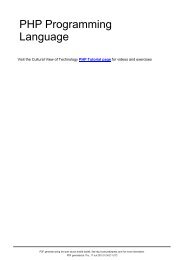Essentials of Javascript - Cultural View
Essentials of Javascript - Cultural View
Essentials of Javascript - Cultural View
You also want an ePaper? Increase the reach of your titles
YUMPU automatically turns print PDFs into web optimized ePapers that Google loves.
JavaScript syntax 19<br />
Comments<br />
Comment syntax is the same as in C++ and many other languages.<br />
// a short, one-line comment<br />
/* this is a long, multi-line comment<br />
about my script. May it one day<br />
be great. */<br />
Note that JavaScript explicitly forbids nesting <strong>of</strong> comments, e.g.<br />
/* You can't do<br />
*/<br />
/* this */<br />
/* But you can<br />
//Do this.<br />
*/<br />
// And you can /* also do this */<br />
// As /* well /* as this */ */<br />
Variables<br />
Variables in standard JavaScript have no type attached, and any value can be stored in any variable. Variables can be<br />
declared with a var statement. These variables are lexically scoped and once a variable is declared, it may be<br />
accessed anywhere inside the function where it is declared. Variables declared outside any function, and variables<br />
first used within functions without being declared with 'var', are global. Here is an example <strong>of</strong> variable declarations<br />
and global values:<br />
x = 0; // A global variable<br />
var y = 'Hello!'; // Another global variable<br />
function f(){<br />
}<br />
var z = 'foxes'; // A local variable<br />
twenty = 20; // Global because keyword var is not used<br />
return x; // We can use x here because it is global<br />
// The value <strong>of</strong> z is no longer available










